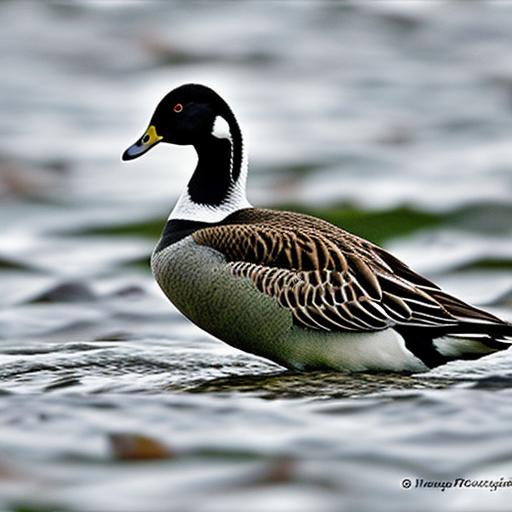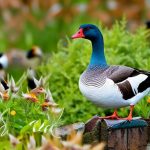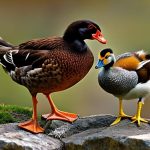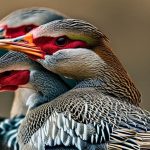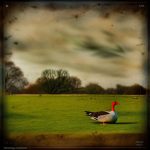Canadian geese, also known as Canada geese, are a familiar sight in the UK. These large waterfowl have become a popular species among bird enthusiasts and are often found in parks, lakes, and other bodies of water across the country. The history of Canadian geese in the UK dates back to the 17th century when they were introduced as ornamental birds. Over time, they have established themselves as a resident species and have adapted well to the British climate.
Canadian geese are popular among bird enthusiasts for several reasons. Firstly, they are beautiful birds with distinctive markings and graceful flight patterns. Their honking calls can also be heard from a distance, adding to their charm. Additionally, Canadian geese are known for their strong family bonds and social behavior, which makes them fascinating to observe. Many bird watchers enjoy spending time observing their interactions and studying their behavior.
Key Takeaways
- Canadian geese are a common sight in the UK and can be kept as pets or for commercial purposes.
- Keeping Canadian geese can provide benefits such as meat, eggs, and pest control.
- Legal considerations for keeping Canadian geese include obtaining a license and following regulations.
- The right environment for Canadian geese includes access to water, shelter, and adequate space.
- Feeding and nutrition for Canadian geese should include a balanced diet and access to clean water.
The Benefits of Keeping Canadian Geese
Keeping Canadian geese can bring several benefits. Firstly, they are excellent for pest control. Canadian geese feed on grasses, weeds, and other vegetation, which can help keep lawns and fields free from unwanted plants. They also eat insects and small invertebrates, which can help control populations of pests such as mosquitoes and ticks.
Another benefit of keeping Canadian geese is that they are low maintenance pets. They are hardy birds that can adapt to a variety of environments and climates. They require minimal grooming and can thrive on a diet of grass, grains, and water. Unlike some other pets, Canadian geese do not require daily walks or exercise routines.
In addition to their practical benefits, Canadian geese can also be kept for ornamental purposes. Their graceful presence and striking appearance can enhance the beauty of any landscape or garden. Many people enjoy having them as part of their outdoor space, adding a touch of nature and elegance.
Legal Considerations for Keeping Canadian Geese
Before keeping Canadian geese, it is important to be aware of the legal considerations involved. In the UK, Canadian geese are protected under the Wildlife and Countryside Act 1981. This means that it is illegal to intentionally kill, injure, or take them from the wild without a license. It is also illegal to disturb their nests or eggs.
If you wish to keep Canadian geese in captivity, you will need to obtain the necessary permits and licenses. This includes a license from Natural England, which regulates the keeping of wild birds in England. The license will outline the conditions and requirements for keeping Canadian geese, such as providing suitable housing and ensuring their welfare.
It is important to note that not everyone is eligible to keep Canadian geese as pets. The permits and licenses required may vary depending on factors such as location and purpose of keeping the birds. It is advisable to consult with local authorities or wildlife organizations to ensure compliance with the relevant regulations.
Choosing the Right Environment for Canadian Geese
Creating the right environment for Canadian geese is crucial for their well-being. They require access to both land and water, as they are semi-aquatic birds. A large pond or lake with ample vegetation and open space is ideal for them. The water should be clean and free from pollutants, as Canadian geese are sensitive to water quality.
In terms of land, Canadian geese need open grassy areas for grazing and nesting. They prefer areas with short grass, as it allows them to easily spot predators and other threats. Providing sheltered areas such as shrubs or trees can also be beneficial, as it gives them a sense of security.
Space is another important consideration when creating an environment for Canadian geese. They require plenty of room to roam and fly, so a large area is necessary. Overcrowding can lead to stress and aggression among the birds, so it is important to provide enough space for them to establish territories and maintain social hierarchies.
Feeding and Nutrition for Canadian Geese
Feeding Canadian geese a balanced diet is essential for their health and well-being. In the wild, they primarily feed on grasses, aquatic plants, and grains. When keeping them in captivity, it is important to replicate their natural diet as closely as possible.
A diet consisting of a variety of grasses, such as ryegrass and fescue, is ideal for Canadian geese. They also benefit from the addition of leafy greens such as lettuce and spinach. Grains such as corn and wheat can be offered in moderation as a source of carbohydrates.
Clean water is also crucial for Canadian geese. They require access to fresh water for drinking and bathing. The water should be changed regularly to prevent the buildup of bacteria or algae. Providing a shallow pool or pond can allow them to engage in natural behaviors such as preening and bathing.
Health and Veterinary Care for Canadian Geese
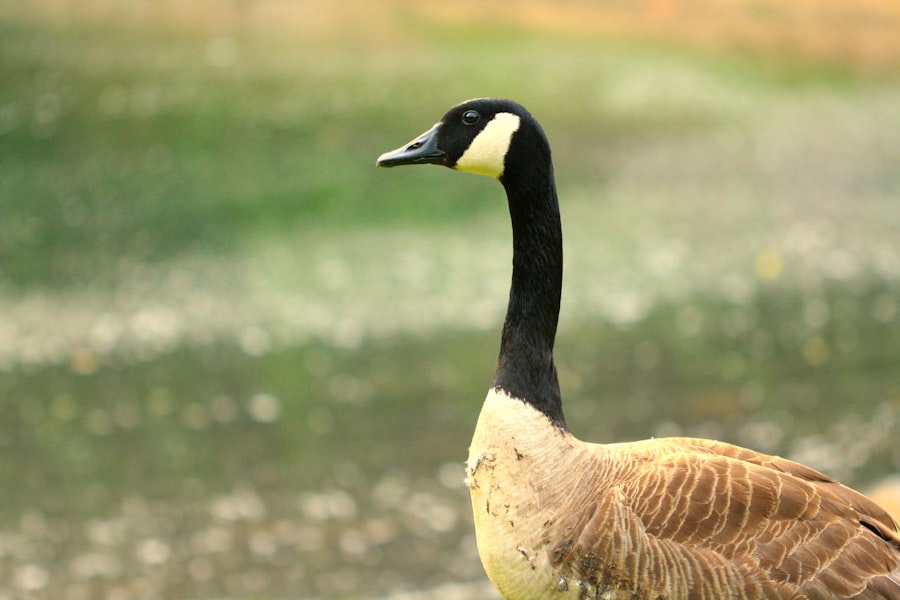
Like any other pets, Canadian geese can experience health issues that require veterinary care. Common health issues in Canadian geese include respiratory infections, parasites, and injuries. It is important to monitor their behavior and appearance for any signs of illness or distress.
Regular check-ups with a avian veterinarian are recommended to ensure the overall health of Canadian geese. The veterinarian can provide vaccinations, perform routine examinations, and offer advice on proper nutrition and care. They can also provide treatment for any health issues that may arise.
Preventive measures such as maintaining a clean environment, providing a balanced diet, and practicing good hygiene can help minimize the risk of health problems in Canadian geese. Regular observation and prompt action in case of any abnormalities can also contribute to their well-being.
Breeding and Reproduction of Canadian Geese
Canadian geese have a well-defined breeding season, which typically occurs in the spring. During this time, they form pairs and establish nesting territories. The female lays a clutch of eggs, usually between 4 to 8 eggs, and both parents take turns incubating them.
The incubation period for Canadian geese is approximately 25 to 30 days. During this time, the parents take turns sitting on the eggs to keep them warm and protected. Once the eggs hatch, the goslings are precocial, meaning they are able to walk and swim shortly after hatching.
The parents play a crucial role in raising the goslings. They provide them with warmth, protection, and guidance. The goslings learn important skills such as foraging and flying from their parents. It is important to provide a safe and secure environment for the breeding pair and their offspring during this time.
Managing Behavioral Issues in Canadian Geese
While Canadian geese are generally docile birds, they can exhibit aggressive behavior in certain situations. This is especially true during the breeding season when they are protecting their nests and young. Aggression can also occur when they feel threatened or cornered.
To prevent and manage aggressive behavior in Canadian geese, it is important to give them space and avoid approaching them too closely. If they display signs of aggression, such as hissing or flapping their wings, it is best to back away slowly and give them a wide berth.
Creating a safe and secure environment for Canadian geese can also help minimize aggression. Providing ample space, suitable nesting sites, and access to water can reduce stress and territorial disputes among the birds. It is also important to avoid feeding them by hand or encouraging them to approach humans, as this can lead to aggressive behavior.
Interacting with Canadian Geese: Dos and Don’ts
When interacting with Canadian geese, it is important to follow certain guidelines to ensure their well-being and safety. Firstly, it is best to observe them from a distance and avoid approaching them too closely. This allows them to feel comfortable and reduces the risk of aggression.
Feeding Canadian geese should be done sparingly and with caution. While it can be tempting to offer them food, it is important to remember that they have specific dietary needs. Feeding them inappropriate foods can lead to health issues and dependency on human handouts.
It is also important to avoid disturbing their nests or eggs. Canadian geese are protective parents and may become aggressive if they feel their young are threatened. Respecting their nesting areas and keeping a safe distance can help ensure the successful breeding and raising of their offspring.
The Rewards of Keeping Canadian Geese in the UK
Keeping Canadian geese as pets can be a rewarding experience for bird enthusiasts. Their beauty, social behavior, and practical benefits make them a popular choice among those looking to enhance their outdoor spaces. However, it is important to be aware of the legal considerations, provide suitable living conditions, and ensure proper care and nutrition for these birds.
By creating the right environment, providing a balanced diet, and practicing good hygiene, Canadian geese can thrive in captivity. Regular veterinary care and observation can help prevent and manage health issues. Respecting their natural behaviors and avoiding aggressive interactions can contribute to their well-being.
Overall, keeping Canadian geese in the UK can bring joy and beauty to both individuals and communities. Their presence can enhance the environment, provide pest control, and serve as a source of fascination for bird enthusiasts. With proper care and attention, Canadian geese can be wonderful additions to any outdoor space.
If you’re interested in learning more about keeping Canadian geese in the UK, you might find this article on Poultry Wizard quite helpful. It discusses the topic of feeding geese chicken feed and whether it is suitable for them. To find out more, check out the article here. Additionally, if you’re looking for information on building a chicken coop, particularly an A-frame design, this article here provides detailed insights. Lastly, if you’re specifically interested in a chicken coop in Grand Island, NE, this article here offers valuable information.
FAQs
What are Canadian geese?
Canadian geese, also known as Canada geese, are a species of waterfowl native to North America. They are known for their distinctive black heads and necks, white chinstrap markings, and brownish-gray bodies.
Why are Canadian geese found in the UK?
Canadian geese were introduced to the UK in the 17th century as ornamental birds in parks and estates. Over time, they have established themselves as a resident breeding species in the UK.
What problems do Canadian geese cause in the UK?
Canadian geese can cause a number of problems in the UK, including damage to crops, gardens, and golf courses, as well as fouling of public areas and waterways. They can also pose a hazard to aircraft and cause safety concerns in urban areas.
How can Canadian geese be managed in the UK?
There are a number of methods for managing Canadian geese in the UK, including habitat modification, egg addling, and culling. Non-lethal methods such as hazing and repellents can also be effective in deterring geese from certain areas.
Is it legal to cull Canadian geese in the UK?
Yes, it is legal to cull Canadian geese in the UK under certain circumstances. However, culling must be carried out in a humane and responsible manner, and a license is required from the relevant authorities.
Meet Walter, the feathered-friend fanatic of Florida! Nestled in the sunshine state, Walter struts through life with his feathered companions, clucking his way to happiness. With a coop that’s fancier than a five-star hotel, he’s the Don Juan of the chicken world. When he’s not teaching his hens to do the cha-cha, you’ll find him in a heated debate with his prized rooster, Sir Clucks-a-Lot. Walter’s poultry passion is no yolk; he’s the sunny-side-up guy you never knew you needed in your flock of friends!

